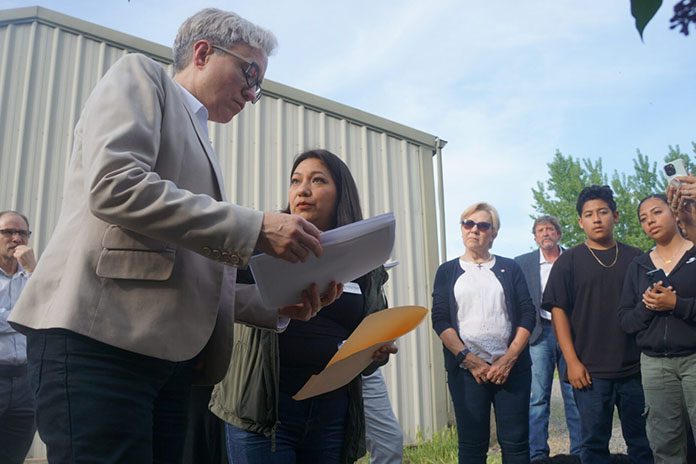
By Alex Baumhardt/Oregon Capital Chronicle
The nonprofit Oregon Rural Action, along with former state environmental regulators and a large coalition of nonprofit groups, is again calling on Gov. Tina Kotek to declare an emergency over drinking water contamination in eastern Oregon and to intervene urgently.
The nonprofit sent a letter Tuesday to Kotek that was co-signed by 27 organizations and two former staff of the Oregon Department of Environmental Quality. It called the nitrate contamination in the Lower Umatilla Basin Groundwater area “among the most pressing environmental justice issues in Oregon,” and said the state continues to be far too slow in responding to the needs of residents who deserve safe drinking water.
Nitrogen from farm fertilizers, animal manure and food processing facilities in the area has for decades seeped into a groundwater aquifer that supplies water to thousands of household wells in Morrow and Umatilla counties, disproportionately serving many low-income and Latino residents. Once bound with water, nitrogen becomes nitrate, which is harmful to consume at high levels over long periods.
In the letter, the signatories called on Kotek to officially declare an emergency in the groundwater area, to fix a water-testing program run by the Oregon Health Authority and to empower the environmental quality department and the Oregon Department of Agriculture to more strictly regulate and penalize the sources of the nitrogen pollution.
Spokespersons from Kotek’s office did not respond to an email requesting a response to the letter by Wednesday evening, while health authority and environmental quality department communications officials told the Capital Chronicle via email that agency officials are reviewing the letter and have not yet responded.
Retired senior administrators join letter
The former staff of Oregon’s environmental quality department who signed the letter – Greg Petit and Mitch Wolgamott – are both retired senior administrators who worked in the agency’s water permitting department and east Oregon office, respectively. Wolgamott is also an Oregon Rural Action board member. Other signatories include The Nature Conservancy of Oregon, Portland-based Latino Network and Oregon Physicians for Social Responsibility.
“The state of Oregon has not responded to this public health crisis with the urgency or seriousness it requires, and it is clear that nothing short of direct intervention by either the governor or the U.S. Environmental Protection Agency will be sufficient to protect the residents of the Lower Umatilla Basin from experiencing further harm. Greater action must be taken,” they wrote.
They also want Kotek to create a plan that spells out how state and local public health and environmental agencies will coordinate and solve the problem, including creating a timeline with measurable outcomes for getting water tested and safe water delivered to those with highly polluted wells.
The letter comes just a month after Kotek visited with residents and volunteers with Oregon Rural Action in Boardman in east Oregon, along with state environmental and public health officials and officials from the regional office of the U.S. Environmental Protection Agency. That visit was a follow up to a meeting Kotek had with residents a year prior, and was meant to provide updates and get feedback on the state’s efforts to get thousands of household wells tested and get safe drinking water delivered to residents who need it.
The health authority, tasked since last year with getting tap water tested for domestic well users, has tested only about one-third of households in Morrow and Umatilla counties that rely on wells. Some residents did not get the results of their water tests until seven or more months after the testing took place, and some were told the water was safe even when the results showed nitrate levels nearly four times the legal limit, according to the letter.
“The state agencies tasked with protecting basin residents, reining in sources of pollution and delivering justice to this community have failed to deliver the timely and sufficient response you promised,” the signatories wrote. “This environmental injustice remains among the most pressing in Oregon, and it is clear that intervention is needed.”
This story first appeared in the Oregon Capital Chronicle.










